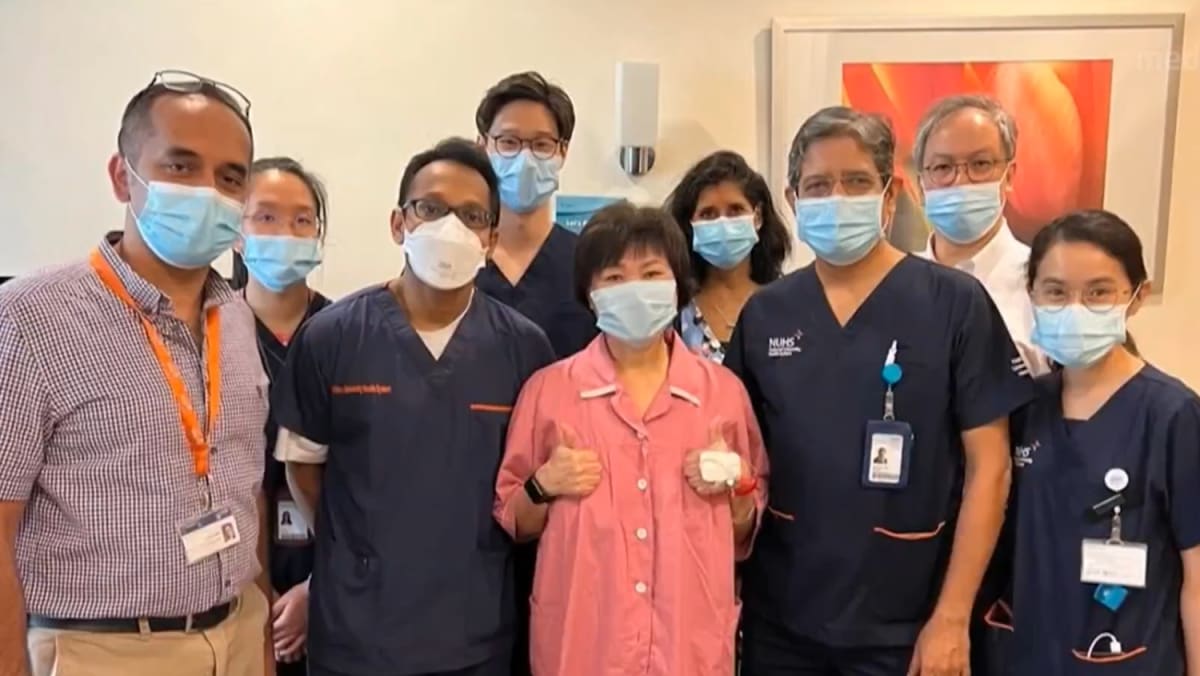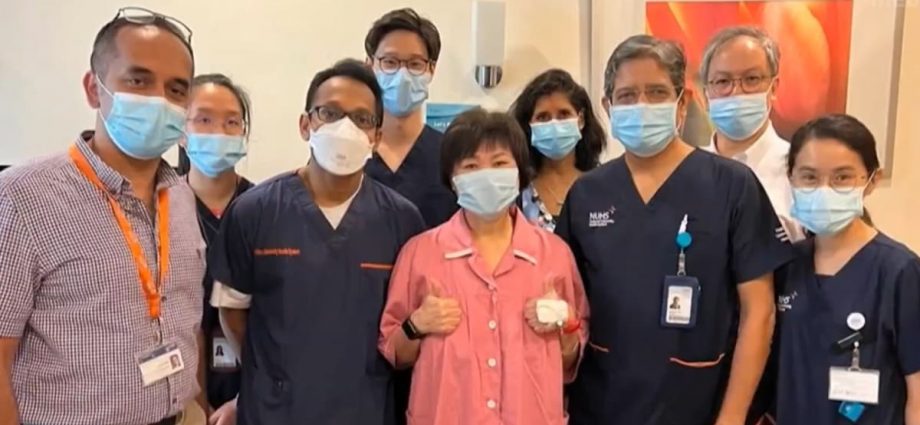
SINGAPORE: It started with a stomach ache and diarrhoea for Madam Lim Gek Meng. Before long, a colonoscopy showed she had stage four colorectal cancer, which had spread extensively to her liver.
“It’s the fourth stage… so that means I will die soon. I was very frightened. Then, I asked the doctors how long I had,” said Mdm Lim, 61, recounting her consultation with doctors in 2020 when she was told of her terminal condition.
Two years later, Mdm Lim is cancer-free, after her son donated part of his liver to her in the first such transplantation for a patient with extensive cancer spread in Singapore.
In July, Mdm Lim received a liver transplant from her son, Mr Goh Jun Le. A multidisciplinary team including pathologists, radiologists, surgeons, hepatologists and oncologists from the National University Health System (NUHS) was involved.
The liver transplant was her only hope after doctors found that they could not surgically remove cancer cells from her liver, as that would risk losing too much of the vital organ.
Conventionally, patients like Mdm Lim undergo chemotherapy to control and prevent the spread of the disease and would have no further treatment options.
BREAKTHROUGH FOR OTHER PATIENTS
Liver transplants were previously not recommended for stage four cancer patients as suppressed immune systems due to the procedure may increase the risk of a cancer relapse. However, studies in the past two decades have shown that transplant is possible with careful patient selection.
To make such a transplant happen, NUHS, along with international experts, formulated patient management guidelines with 44 criteria to help define specific patient profiles suitable for the procedure, as well as tests for treatment in the course of the transplant, and aftercare.
Eligible patients include, for instance, colon cancer patients whose disease has spread only to the liver that is not operable upfront and is responding well to chemotherapy, said Associate Professor Glenn Bonney, consultant at the division of hepatobiliary and pancreatic surgery at the National University Hospital (NUH).
He added that the cut-off age for transplants is generally at 70.
It took more than 50 medical professionals to assess Mdm Lim’s condition, carry out treatment procedures, and provide follow-up care.
Liver transplantation increases one’s chances of surviving by at least another five years, from lower than 20 per cent to more than 60 per cent, and the breakthrough has paved the way for other suitable candidates to undergo the procedure.
Colorectal cancer is the most common cancer in men and second most common cancer in women in Singapore. More than 50 per cent of patients develop metastases – the spread of cancer cells – to the liver, according to the National University Cancer Institute Singapore (NCIS).
“The colon gets all the nutrition and food goes through the colon, and there’s a very important blood vessel that takes that digested food through blood into the liver,” Assoc Prof Bonney said.
“When colon cancer appears in the colon, the cells are capable of going through that blood vessel to the liver and therefore, by far and away, the most common way for colon cancer to spread, is to the liver.”
Assoc Prof Bonney said that he felt privileged to be part of Mdm Lim’s recovery process and to be part of the team leading Singapore’s – and the region’s – first liver transplant in a stage four cancer patient.
“I feel really privileged to be able to work in a system that can generate that kind of care, to finally reach a stage where after that two years… to have transplanted our patient, to be standing there with the whole team in intensive care, when she was fully awake after transplant to tell her: ‘Mdm Lim, today you don’t have cancer’,” he said.
TAKING CARE OF MDM LIM
Assoc Prof Bonney said that Mdm Lim’s aftercare consists of two priorities – first to ensure that there are no episodes of rejection for her liver, and second to ensure there is no relapse due to a weakened immune system.
“I have to do a follow up very week, but I feel very fortunate that I can even do a follow up every week,” said Mdm Lim in Mandarin. “I want to live. I want to defeat cancer. The most important thing is I’m alive.”
Her son Mr Goh said that when the opportunity came – his liver was a match and could be transplanted in Mdm Lim – he thought: “Let me go for it. Because she is my mother and I want to help her.”
“When I came out of the surgery room, when I woke up, I was relieved to find out that the surgery went well and afterwards, over the weeks, that her liver — my liver that was transplanted into her – is still working well,” Mr Goh said.
He was relieved and happy, he added.
“He’s very brave,” Mdm Lim said of her son. “When he said yes to donating his liver to me, I was very heartened. I gave him life, and now he’s given me mine.”

